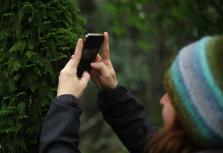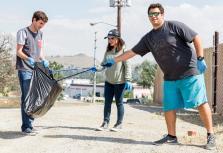
Opportunity Details
iNaturalist's website and mobile apps run on open source code. We have a small team of engineers, but we welcome contributions from volunteers to tackle open issues. You can read more about contributing to our 3 key repos (website, Seek, and not-yet-released mobile):https://github.com/inaturalist/inaturalist/blob/main/CONTRIBUTING.md
https://github.com/inaturalist/SeekReactNative/blob/main/CONTRIBUTING.md
https://github.com/inaturalist/iNaturalistReactNative/blob/main/CONTRIBUTING.md

Opportunity Details
iNaturalist is used all over the world. The iNaturalist website, iNaturalist mobile apps, and Seek by iNaturalist app have been translated into dozens of languages thanks to volunteers. Have you noticed missing or incorrect translations in your preferred language? We need your help!We use a platform called Crowdin for localizing the user interfaces. You can find more information about how it works here: https://www.inaturalist.org/pages/translate

Opportunity Details
iNaturalist generates the most diverse, recent, and dynamic dataset of biodiversity in the world. You can help it grow and maintain high quality data by:- Posting your own observations (especially focusing on less-observed areas and species)
- Encouraging others to use iNaturalist (especially in less-observed areas)
- Identifying other people's observations
- Adding annotations to observations
You can find more links and details here: https://forum.inaturalist.org/t/ways-to-help-out-on-inat-wiki/1983

Opportunity Details
Join local and international volunteers to scuba dive and preserve the underwater environment!Explore and conserve Barcelona’s diverse coastal ecosystem while volunteering with the Catalan federation of scuba diving and marine preservation. Become PADI Open Water certified or/and enhance your current dive skills with select PADI.This is a great way to engage in an authentic Barcelona experience outside tourist circuits and to build lifelong friendships with like-minded volunteers. Duties include trash removal and seabed cleanup, collecting data on native species, and assessing local biodiversity. Summer volunteers can also assist in camps for disadvantaged children, organizing workshops on the sea and the environment.
Typical week:
Sunday: arrival at Barcelona Airport, settle in the NGO’s apartment.
Monday to Friday: morning snacks, dive training, underwater observations, maintenance, community work.
Saturday & Sunday: free visit & free excursion in Barcelona with volunteers.
Important note: non-certified dives should sign up for a minimum of two weeks to participate in conservation dives. The program does not provide dive computers. Advanced certified divers must bring their own dive light/torch for optional night or deep dives.
Requirements:
Minimum 1 week – Maximum 12 weeks
Ages 18 and above (16-17 with parental authorization)
Families with kids aged 14+
Opportunity Details
Join a team of volunteers dedicated to Community Development to empower self-esteem and pride to come from a neglected neighborhood in Barcelona!We seek positive individuals interested in creating solidarity networks and promoting social inclusion. Join an international community dedicated to fighting poverty. This program is a great way to experience an authentic side of Barcelona, forging lifelong friendships, and engaging in activities like food collection and distribution.
Typical Week:
Monday: focus on planning and preparing activities for the week, with additional workshops.
Tuesday: involve food bank operations, disinfection, and distribution to local families.
Wednesday: activities with elderly people, coaching sessions, and language classes.
Thursday: working on an organic farm and ending with a meditation workshop.
Friday: team meetings, food distribution to the homeless, and monthly charity events.
Saturday and Sunday: rest and enjoy Barcelona.
There is also a general training of two hours per week covering cross-cultural aspects, human resources, food regulations, and NGO management.
Join us and make a difference in Barcelona!

Opportunity Details
Learn about the island fox and convey their story to the general public. Help raise funds for island fox conservation through sales and donations.Available Shifts
| Shift Name | Signup Max | Start | End |
|---|---|---|---|
| 1st Shift | 6 | n/a | n/a |
| 2nd Shift | 6 | n/a | n/a |

Opportunity Details
Main Beach is a south-facing beach that stretches from the mouth of the San Lorenzo River tothe Santa Cruz Municipal Wharf wooden pier. Even with the large expanse of sand the beach gets packed with tourists and locals on sunny days. With the Boardwalk and the Wharf – it gets heavy use and that means lots of opportunities for debris to be left behind. But not all the trash we collect is from beach goers, much of it gets washed onto the beach from gutters throughout the city and from San Lorenzo River or washed up during winter storms.
Our goal is to remove all the unnatural debris from the beach. We especially want to focus on removing all the small bits of plastic and clear plastic such as straws and bags because they are often mistaken for food by marine animals and shore birds. Cigarette butts are also important to remove because they never fully decompose.
What to bring / wear: Dress in comfortable clothes and shoes and wear sunglasses or a hat. We recommend bringing a reusable water bottle.
Available Shifts
| Shift Name | Signup Max | Start | End |
|---|---|---|---|
| Apple Global Security | no limit | n/a | n/a |
Opportunity Details
Donate your time and sweat equity to help us establish a new nature preserve in Evans, GA. Skills requested: chainsaw operation/tree felling; general construction and facilities maintenance; tractor, bushhog, and lawn/farm machinery operation; gardening and landscaping, etc.
Opportunity Details
Everyone wants to live, work, and play in a clean and green community. It’s up to everyone to help to improve the overall quality of life for us all.Picking up litter is a simple and easy activity. It is also a great opportunity to bring the community together for the betterment of our blocks, our neighborhoods, and our city.
Through Keep Allentown Beautiful's Community Cleanups initiative, the City of Allentown will provide cleanup tools and resources at no cost to our residents. If you are interested in having a Community Cleanup in your neighborhood, please complete our request form linked below.
Thank you for Keeping Allentown Beautiful!
Website for more details: https://www.allentownpa.gov/Public-Works/Recycling-Solid-Waste/Keep-Allentown-Beautiful/Volunteers-Needed
Opportunity Details
Future Proofing Little Penguin Habitat - This project has been made possible thanks to the support of the Penguin Foundation and a NAB Foundation Community Grant. We are seeking a team of approximately 30 people to assist conservation team the who are working on the Summerland Peninsula revegetation. There are approximately 10,000 seedlings that need to be planted as part of the project.9.30am – Guests arrive at Penguin Parade for an induction and presentation on the Summerland Peninsula
10.30am – Planting
1pm – Lunch at the Nobbies
2pm – Planting
4pm – Thank you and day ends
More information on the project: https://www.penguins.org.au/about/local-community/news/future-proofing-little-penguin-habitat/
As part of our Child Safety Requirements, can all volunteers please obtain a Volunteer Working With Children Check. There will be no direct contact with children as part of the activity; however, school groups and children will be visiting our sites. Thank you.
Optional – Guests are welcomed to stay for the evening Penguin Parade to occur at dusk (approx. 6pm) - tickets would need to be purchased via the Phillip Island Nature Parks website: https://www.penguins.org.au/buy-tickets/group/1
Available Shifts
| Shift Name | Signup Max | Start | End |
|---|---|---|---|
| General | 30 | n/a | n/a |
